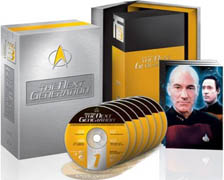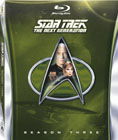Evolution
Most fans of The Next Generation will agree that its third season marks the point when
the show really came together as a vehicle for high quality optimistic futuristic stories,
and became the phenomenon that elevated the Star Trek franchise to new heights.
All true; however, that shift really was a gradual one. Indeed, many late season two
stories give an accurate preview of that shift, while some of the early season three
stories remain a bit slow off the mark.
Here in "Evolution", the Next Generation's third season opens with a quieter,
nicely written story about the pressures and struggles of early overachievers.
Though this centers most obviously on Wesley Crusher and the main guest star
Dr. Stubbs played by Ken Jenkins,
many of the other characters are roped in to the examination of the issue
in fairly organic fashion.
Dr. Beverly Crusher is back after her absence from season two, and the housekeeping
that deals with her return is fused fairly seamlessly into the narrative. As she
works to try to reconnect with her son Wesley, she more keenly notices the stresses
he is under, and she comes with additional reason to question his behaviour. Nicely,
we get a bit more background about both Picard and Beverly as they contrast their younger
years with Wesley's current life.
There is enough character exploration in this story to give both Guinan and Troi
plenty to do. Guinan does her usual quiet thing in a few places, while Whoopi Goldberg
makes it look effortless. But it is perhaps Troi who has the best scene - against
Dr. Stubbs in his quarters, as she makes a poignant observation about the
tension that fills the room. Perhaps we all know people like Stubbs who,
under great pressure, create a similar atmosphere, even though their intentions
are good.
Where the story deviates from this theme of pressured over-achievers,
it typically embraces other major threads of the franchise.
The concept of putting violence aside
in order to talk one's way to peaceful solutions is also showcased here,
as it was way back in the first Trek pilot "The Cage", while the need to
overcome the violent instinct is a staple Trek theme which featured heavily in
"Encounter at Farpoint",
and as a key point in
"Gambit".
The Borg continue to be foreshadowed in this one, partly from one of the computer glitches
early on, and also from the general behaviour of the Nannites and where that seems
headed. It would be another eight years or so, though, before the two ideas
actually meshed officially.
Perhaps subtlest of all, because no one truly speaks directly of it, one can feel
the concept of a meritocracy driving the behaviour of many of the characters here.
It's in the background, a need for every person to better themselves and offer their
best to society. It keeps everyone's interactions up to a standard that makes good
clean television viewing. It's easy to see how all these things helped Piller's script get
fast-tracked into production.
And of course, Stubbs' love of baseball is a foreshadowing of Benjamin Sisko's similar
feelings on the subject, which reigned during his long streak on Deep Space Nine.
Appropriately, there are some gorgeously grand visuals in the piece, firstly
with an all-new spacey opening section for the title sequence that will continue
until TNG's last episode, but also with the liberal use of some impressive
vistas of a bluish white dwarf star pulling dusty gaseous material off of its
red giant companion star. Nicely, the story's bookending scenes that revel
in this spectacle are graced by one of the most beautiful pieces of music ever
composed for the series:
Ron Jones' wonderful "Double Star" theme.
While "Evolution" isn't quite the exciting action adventure you might expect as a
season opener, it is quite a polished piece with depth of character and suitably
interesting ideas and drama - a healthy sign of more good things to come....
| 







 (regular)
(regular)



